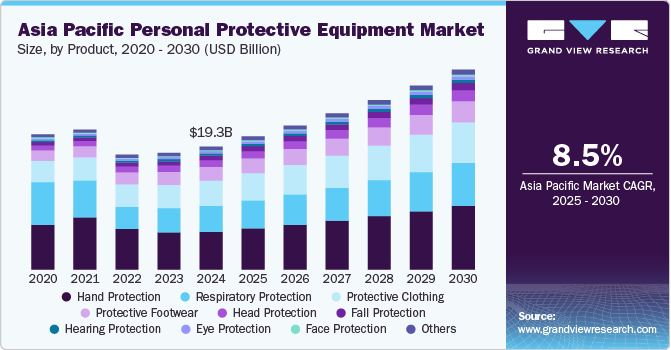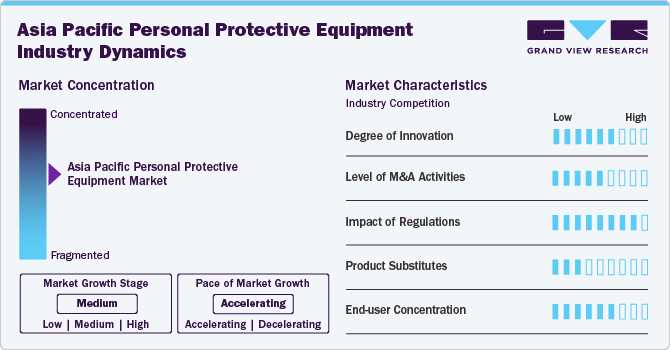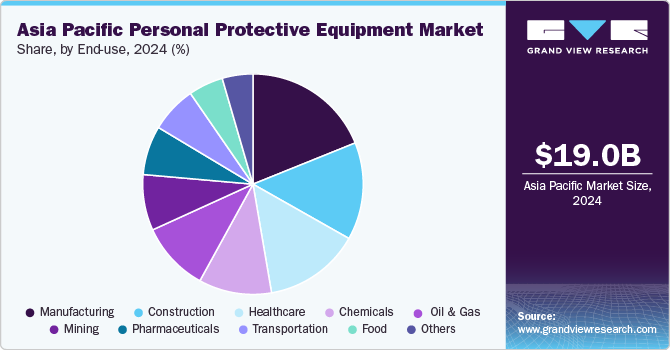- Home
- »
- Advanced Interior Materials
- »
-
Asia Pacific Personal Protective Equipment Market Report, 2030GVR Report cover
![Asia Pacific Personal Protective Equipment Market Size, Share & Trends Report]()
Asia Pacific Personal Protective Equipment Market (2025 - 2030) Size, Share & Trends Analysis Report By Product (Hand Protection, Eye Protection), By End-use (Construction, Manufacturing), By Country, And Segment Forecasts
- Report ID: GVR-4-68040-291-7
- Number of Report Pages: 172
- Format: PDF
- Historical Range: 2018 - 2022
- Forecast Period: 2025 - 2030
- Industry: Advanced Materials
- Report Summary
- Table of Contents
- Segmentation
- Methodology
- Download FREE Sample
-
Download Sample Report
Market Size & Trends
The Asia Pacific personal protective equipment market size was estimated at USD 19.30 billion in 2024 and is projected to grow at a CAGR of 8.5% from 2025 to 2030. Rising employee health and safety awareness owing to increasing instances of industrial deaths in emerging economies such as China, Thailand, and Indonesia due to the shortage of personal protective equipment are expected to fuel the market growth in the region during the forecast period. Moreover, technological innovations related to smart PPE and surging customer demand for protective gear that is a mix of attractive designs with safety are also leading to the market growth in the Asia Pacific.

Smart personal protective equipment has gained popularity in various industries such as mining, oil and gas, manufacturing, and transportation. In the mining industry, for example, smart locating devices are increasingly utilized to track the whereabouts of miners, enhancing safety measures, and enabling more efficient responses to emergencies. Furthermore, IoT (Internet of Things)-based personal protective equipment compliance sensors are capable of monitoring workers' physiology and assessing whether they are wearing personal protective equipment correctly. For instance, hard helmets must be worn properly according to OSHA requirements to ensure effectiveness. These helmets are equipped with sensors that can detect issues such as a poor fit or other violations of how a worker should use them, promptly alerting the wearer to take corrective action.
Market Concentration & Characteristics
The Asia Pacific personal protective equipment industry is characterized by a high level of industry concentration, with a few key players dominating the market share. Major global manufacturers, including 3M, Honeywell, and DuPont, have established a strong presence in the region due to their advanced technological capabilities and vast distribution networks. These companies cater to the growing demand across various sectors, such as healthcare, manufacturing, construction, and oil & gas, which have seen an uptick in the need for PPE due to rising safety regulations, industrial activities, and health concerns. In addition, local players in countries like China, India, and Japan also contribute to market share by offering region-specific products that cater to local safety standards and requirements.
A prominent feature of the Asia Pacific personal protective equipment industry is the rapid growth driven by increasing industrialization, population growth, and a growing focus on workplace safety. As countries in the region continue to expand their manufacturing and construction sectors, the demand for PPE, including gloves, masks, helmets, and safety clothing, is expected to rise significantly. The COVID-19 pandemic further accelerated this growth by highlighting the importance of health and safety protocols, particularly in healthcare settings, leading to higher demand for protective gear such as face masks, medical gowns, and face shields.

Another defining characteristic of the Asia Pacific personal protective equipment industry is the diversity in consumer needs and product types, driven by the varied industrial sectors across the region. For instance, the manufacturing sector in countries like China and India requires industrial-grade safety equipment to mitigate workplace hazards, while the healthcare sector across the region demands high-quality medical PPE for infection control. This variation creates a fragmented market with specialized products tailored for specific industries, and manufacturers are continuously innovating to address these unique safety challenges. The demand for eco-friendly and reusable PPE products is also rising, reflecting global sustainability trends and heightened environmental concerns in Asia Pacific countries.
In terms of regional market dynamics, China holds a dominant position in the Asia Pacific personal protective equipment industry due to its large manufacturing base and rapid industrialization. The country is not only a major consumer of PPE but also a key supplier, with many PPE manufacturers located in the region. India, Japan, and South Korea follow closely behind, with each contributing to the market growth through increased industrial activity, government policies mandating worker safety, and a rising focus on healthcare infrastructure. As these markets continue to evolve, the Asia Pacific PPE market is expected to witness steady growth, driven by both global and local players striving to meet the increasing demand for safety equipment across diverse sectors.
Drivers, Opportunities & Restraints
The Asia Pacific personal protective equipment industry is primarily driven by the rapid industrialization and urbanization across the region. As industries such as manufacturing, construction, and healthcare expand, the need for safety equipment grows to ensure worker protection and compliance with stringent safety regulations. The increasing awareness of workplace safety, particularly in high-risk sectors, and the heightened focus on health due to events like the COVID-19 pandemic, have further contributed to the growth of the PPE market. In addition, government regulations and labor laws mandating the use of PPE in industrial and healthcare settings continue to boost market demand.
The Asia Pacific personal protective equipment industry presents significant opportunities for the development of eco-friendly and sustainable protective gear. As environmental concerns rise, there is a growing demand for reusable, recyclable, and biodegradable PPE products. Manufacturers who can innovate and offer sustainable solutions are well-positioned to capture a larger market share. Furthermore, the increasing adoption of advanced materials and technologies, such as smart PPE equipped with sensors or antimicrobial fabrics, provides an opportunity for companies to create high-performance products that cater to diverse industries like healthcare, construction, and oil & gas, further driving market expansion.
The growth of the Asia Pacific personal protective equipment industry is restrained by factors such as high production costs and supply chain challenges. Many PPE products are manufactured from specialized materials, which can be expensive, impacting the overall affordability of protective gear. In addition, the reliance on raw material imports and manufacturing facilities from specific regions, such as China, makes the PPE market vulnerable to global supply chain disruptions. Moreover, counterfeit or substandard PPE products entering the market, particularly in emerging economies, can hinder growth by reducing consumer confidence and raising concerns about safety standards.
Products Insights
The hand protection segment led the market with the largest revenue share of 30.7% in 2024. Hand protection is essential across various industries such as construction, food processing, oil & gas, healthcare, and metal fabrication to prevent common hand injuries. Hand protection equipment is utilized in manufacturing to mitigate injuries stemming from cuts, abrasions, burns, and exposure to chemicals. These safeguard hands against splinters, excessive vibrations, knives, sharp edges, blood & bodily fluids, electricity, hot objects, and extreme cold.
Fall protection equipment is used in various industries, including power generation, construction, and oil & gas. Increasing awareness about employee safety across industries is expected to fuel the demand in this segment. The fall protection equipment includes chest harnesses, safety nets, body belts, and suspension belts. Fall protection equipment are used in the construction industry to protect workers from injuries due to free falls.
End Use Insights
Based on end use, the manufacturing segment led the market with the largest revenue share of 18.96% in 2024. The manufacturing sector in Asia Pacific is a major driver of the personal protective equipment market, owing to the region’s rapid industrialization and stringent workplace safety regulations. Workers in manufacturing facilities are exposed to a variety of hazards, including mechanical injuries, exposure to harmful chemicals, extreme temperatures, and high noise levels.

The healthcare industry in the Asia Pacific is a significant driver of the personal protective equipment industry, fueled by increasing healthcare infrastructure, stringent infection control protocols, and growing awareness of occupational safety. Healthcare professionals, including doctors, nurses, and laboratory technicians, are exposed to various biological hazards, infectious diseases, and hazardous chemicals, necessitating the use of specialized PPE.
Country Insights
China dominates the Asia Pacific personal protective equipment market due to its vast manufacturing base and rapid industrialization. As one of the world’s largest industrial hubs, China has a high demand for PPE, particularly in sectors like manufacturing, construction, and healthcare. The country’s strict labor safety regulations and the growing emphasis on worker protection further fuel the market’s growth. China also plays a key role in the global PPE supply chain, both as a major consumer and manufacturer.
India’s personal protective equipment market is experiencing rapid growth, driven by the country’s booming industrial and healthcare sectors. The rising awareness about worker safety, government initiatives to improve labor conditions, and stricter enforcement of occupational safety regulations are key factors contributing to market expansion.
Key Asia Pacific Personal Protective Equipment Company Insights
Some of the key players operating in the market include 3M, DuPont,among others.
-
3M is publicly traded on the New York Stock Exchange with the ticker code MMM. Its products are distributed globally through an extensive distribution network comprising direct and third-party supply channels such as retailers, wholesalers, dealers, distributors, and jobbers. The company’s PELTOR subsidiary is involved in manufacturing eye protection, head & face protection, hearing protection, and protective communication products. The safety & industrial business group comprises abrasives, adhesives & tapes, closure & masking systems, roofing granules, and automotive aftermarkets, which primarily cater to electrical, industrial, and safety markets. The healthcare business group caters to the healthcare industry and includes medical solutions, separation and purification sciences, oral care, drug delivery systems, and health information systems.
-
DuPont operates across six key segments: Agricultural Products, High-Performance Materials, Food & Personal Care, People & Process Safety, Polymers & Fibers, and Industrial Biotechnology. It serves a diverse range of end-use sectors, including Food & Beverage, Agriculture, Electronics & Communications, Safety & Protection, Packaging & Printing, Chemicals, Marine, Mining, Energy, Apparel, Automotive, Aerospace, Building & Construction, Government & Public Sector, Healthcare & Medical, and Manufacturing & Industrial. The company’s extensive product portfolio includes Adhesives, Advanced Printing Solutions, Clean Technologies, Construction Materials, Consumer Products, Electronic Solutions, Fabrics, Fibers & Nonwovens, Home & Garden & Car Care, Industrial Films, Medical Devices & Materials, Packaging Materials & Solutions, Personal Protective Equipment, Resins, and Water Solutions.
Key Asia Pacific Personal Protective Equipment Companies:
The following are the leading companies in the Asia Pacific Personal Protective Equipment Market. These companies collectively hold the largest market share and dictate industry trends.
- 3M
- Lakeland Industries, Inc.
- DuPont
- Honeywell International, Inc.
- Ansell Ltd.
- Alpha Pro Tech Limited
- Top Glove Corporation Bhd
- KARAM
- Hartalega Holding Berhard
- Mine Safety Appliances (MSA) Company
- Lindstrom
- Mallcom (India) Limited
- Radians, Inc.
- Polison Corp.
- Delta Plus Group
- Safety Jogger
Recent Developments
-
In April 2024, Lakeland Industries Inc. announced the acquisition of LHD Group Deutschland GmbH, a leading supplier of integrated solutions for protective and professional apparel in the fire service, military, police, and uniform industries, with a definitive agreement.
-
In May 2024, KARAM Safety, a leading global provider of PPE and fall protection solutions, announced the successful acquisition of Midas Safety India, a prominent player in the hand protection safety products industry.
Asia Pacific Personal Protective Equipment Market Report Scope
Report Attribute
Details
Market size value in 2025
USD 20.87 billion
Revenue forecast in 2030
USD 31.34 billion
Growth rate
CAGR of 8.5% from 2025 to 2030
Base year for estimation
2024
Historical data
2018 - 2023
Forecast period
2025 - 2030
Quantitative units
Revenue in USD million/billion and CAGR from 2025 to 2030
Report coverage
Revenue forecast, company ranking, competitive landscape, growth factors, and trends
Segments covered
Product, end use, region
Regional scope
Asia Pacific
Country scope
China; India; Japan; South Korea; Indonesia; Australia; Thailand; Malaysia
Key companies profiled
3M; Lakeland Industries, Inc.; DuPont; Honeywell International, Inc.; Ansell Ltd.; Alpha Pro Tech Limited; Top; Glove Corporation Bhd; KARAM; Hartalega Holding Berhard; Mine Safety Appliances (MSA) Company; Lindstrom; Mallcom (India) Limited; Radians, Inc.; Polison Corp.; Delta Plus Group; Safety Jogger
Customization scope
Free report customization (equivalent up to 8 analysts working days) with purchase. Addition or alteration to country, regional & segment scope.
Pricing and purchase options
Avail customized purchase options to meet your exact research needs. Explore purchase options
Asia Pacific Personal Protective Equipment Market Report Segmentation
This report forecasts revenue growth at global, regional & country levels and provides an analysis of the industry trends in each of the sub-segments from 2018 to 2030. For this study, Grand View Research has segmented the Asia Pacific personal protective equipment market report based on product, end use, and region:
-
Product Outlook (Revenue, USD Billion, 2018 - 2030)
-
Head Protection
-
Eye Protection
-
Face Protection
-
Hearing Protection
-
Protective Clothing
-
Heat & flame protection
-
Chemical defending
-
Clean room clothing
-
Mechanical protective clothing
-
Limited general use
-
Others
-
-
Respiratory Protection
-
Air-purifying respirator
-
Supplied air respirators
-
-
Protective Footwear
-
Leather
-
Rubber
-
PVC
-
Polyurethane
-
Others
-
-
Fall Protection
-
Soft Goods
-
Hard Goods
-
Others
-
-
Hand Protection
-
Disposable by Type
-
General purpose
-
Chemical handling
-
Sterile gloves
-
Surgical
-
Others
-
-
Disposable by Material
-
Natural Rubber
-
Nitrile
-
Vinyl
-
Neoprene
-
Polyethylene
-
Others
-
-
Durable
-
Mechanical gloves
-
Chemical handling
-
Thermal/flame retardant
-
Others
-
-
-
Others
-
-
End Use Outlook (Revenue, USD Billion, 2018 - 2030)
-
Construction
-
Manufacturing
-
Oil & Gas
-
Chemicals
-
Food
-
Pharmaceuticals
-
Healthcare
-
Transportation
-
Mining
-
Others
-
-
Country Outlook (Revenue, USD Billion, 2018 - 2030)
-
China
-
India
-
Japan
-
South Korea
-
Indonesia
-
Australia
-
Thailand
-
Malaysia
-
Frequently Asked Questions About This Report
b. Asia Pacific personal protective equipment market size was estimated at USD 19.30 billion in 2024 and is expected to be USD 20.87 billion in 2025.
b. The Asia Pacific personal protective equipment market, in terms of revenue, is expected to grow at a compound annual growth rate of 8.5% from 2025 to 2030 to reach USD 31.34 billion by 2030.
b. The manufacturing segment dominated the market in 2024 by accounting for a share of 19.0%. The manufacturing sector in Asia Pacific is a major driver of the personal protective equipment (PPE) market, owing to the region’s rapid industrialization and stringent workplace safety regulations.
b. Some of the key players operating in the Asia Pacific personal protective equipment market include: 3M, Lakeland Industries, Inc., DuPont, Honeywell International, Inc., Ansell Ltd., Alpha Pro Tech Limited, Top, Glove Corporation Bhd, KARAM, Hartalega Holding Berhard, Mine Safety Appliances (MSA) Company, Lindstrom, Mallcom (India) Limited, Radians, Inc., Polison Corp., Delta Plus Group, Safety Jogger.
b. Key factors that are driving the Asia Pacific personal protective equipment market growth include Favorable occupational safety regulations and the growing importance of safety and security in workplaces.
Share this report with your colleague or friend.
Need a Tailored Report?
Customize this report to your needs — add regions, segments, or data points, with 20% free customization.

ISO 9001:2015 & 27001:2022 Certified
We are GDPR and CCPA compliant! Your transaction & personal information is safe and secure. For more details, please read our privacy policy.
Trusted market insights - try a free sample
See how our reports are structured and why industry leaders rely on Grand View Research. Get a free sample or ask us to tailor this report to your needs.










